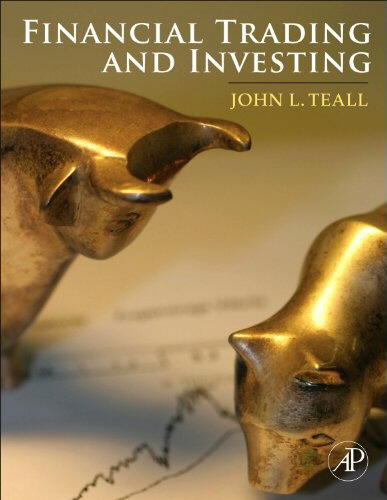 |
|
|
Financial
Trading and Investing
By: John L. Teall
Academic Press, 2013
225 WymanStreet, Waltham, MA 02451, USA
The Boulevard, Langford Lane
Kidlington, Oxford OX51GB UK
Academic Press is an imprint of Elsevier
ISBN-10: 0123918804;
ISBN-13: 978-0123918802
443 pages, Hard Cover
HG4521.T36 2013
332.6—dc23
Ancillary materials are located at the book’s
companion site at
www.elsevierdirect.com/companions/9780123918802 |
|
ABOUT
THE BOOK
From The Publisher
This textbook teaches trading techniques, strategies, and regulations
by placing them squarely within the structures of financial markets.
Key Features
- Introduces the financial markets and the
quantitative tools used in them so students learn how the markets
operate and gain experience with their principal tools
- Helps students develop their skills with
the most popular trading simulation programs so they can reuse the book
to solve day-to-day problems
- Stretches from investor behavior to
hedging strategies and noise trading, capturing recent advances in an
up-to-date reference source
Description
A former member of the American Stock
Exchange introduces trading and financial markets to upper-division
undergraduates and graduate students who are planning to work in the
finance industry. Unlike standard investment texts that cover trading
as one of many subjects, Financial Trading and Investments
gives primary attention to trading, trading institutions, markets, and
the institutions that facilitate and regulate trading activities-what
economists call "market microstructure." The text will be accompanied
by a website that can be used in conjunction with TraderEx, Markit,
StocklinkU, Virtual Trade, Vecon
Lab Experiment, Tradingsim, IB Student Trading Lab,
Brenexa, Stock Trak and How
the Market Works.
|
Reviews
"Teall’s Financial Trading and Investing
presents clear and up-to-date coverage of trading and market
microstructure. Arbitrage and hedging examples in currency, forwards,
fixed income and options markets are well developed, with particular
attention devoted to implementing transactions."--Ahmet K. Karagozoglu,
Hofstra University
"I enjoyed reading the material in
Financial Trading and Investing. Dr. Teall’s coverage of
the content in this text is very thorough, and it fills a niche in
academic and professional literature on trading and market
microstructure."--Travis Jones, Florida Gulf Coast University
"The presentation is well supported not only by the extensive use of
professional literature but also by examples in each chapter. The
end-of-chapter questions enhance learning by enabling students to apply
concepts in meaningful ways. They make the material more ‘real
world' for advanced undergraduates or graduate students."
--Kevin Klein, Illinois College
|
Buy at:
Amazon.com |
|
Preface
I. INTRODUCTION
TO SECURITIES TRADING AND MARKETS
A. Trades,
Traders, Securities and Markets
B. Securities
Trading
C. Bargaining
D. Auctions
E. Introduction
to Market Microstructure
F. Orders,
Liquidity and Depth
G. Day
Trading
II. FINANCIAL
MARKETS, TRADING PROCESSES AND
INSTRUMENTS
A. Exchanges
and Floor Markets
B.
Over
the Counter Markets and Alternative Trading Systems
C.
The
Decline of Brick and Mortar
D.
Crossing
Networks and the Upstairs Markets
E.
Quotation,
Inter-market and Clearing Systems
F. Brokerage
Operations
G. Fixed
Income Securities and Money Markets
H.
Markets
around the World
I. Currency
Exchange and Markets
III. INSTITUTIONAL
TRADING
A.
Institutions
and Market Impact
B.
Registered
Investment Companies
C.
Unregistered
Investment Companies
D.
Best
Execution, Execution Costs and Price Improvement
E.
Algorithmic
Trading
F.
Dark
Pools
G. Stealth
and Sunshine Trading
H. High
Frequency Trading
I. Flash
Trading and Sponsored Access
IV. REGULATION OF
TRADING AND SECURITIES
MARKETS
A. Background
and Early Regulation
B. Securities
Market Legislation: The Foundation
C. Crises
and Updating the Regulatory System
D. Deregulation,
Corporate Scandals and the Financial Crisis of 2008
E. Dodd-Frank
F. Government
Oversight of Self-Regulation: The S.E.C. and C.F.T.C.
G. Impact
of Regulatory Activity
H. Regulation:
The International Arena
I. Privatization
of Regulation and Exchange Rules
V. ADVERSE
SELECTION, TRADING AND SPREADS
A.
Information
and Trading
B.
Noise
Traders
C.
Adverse
Selection in Dealer Markets
D.
Adverse
Selection and the Spread
VI.
RANDOM
WALKS, RISK AND ARBITRAGE
A. Market
Efficiency and Random Walks
B. Risk
C. Arbitrage
D. Limits
to Arbitrage
Appendix A:
Return and Risk Spreadsheet Applications
Appendix B: A
Primer on Black-Scholes Option Pricing
Appendix C:
Estimating Implied Black-Scholes Volatilities
VII. ARBITRAGE AND HEDGING WITH
FIXED INCOME INSTRUMENTS
AND CURRENCIES
A. Arbitrage
with Riskless Bonds
B. Fixed
Income Hedging
C. Fixed
Income Portfolio Immunization
D. Term
Structure, Interest Rate Contracts and Hedging
E. Arbitrage
with Currencies
F.
Arbitrage and Hedging with Currency Forward
Contracts
G.
Hedging Exchange Exposure
VIII. ARBITRAGE AND HEDGING WITH OPTIONS
A. Derivative Securities Markets and Hedging
B. Put-Call Parity
C. Options and Hedging in a Binomial Environment
D. The Greeks and Hedging in a Black-Scholes
Environment
E. Exchange Options
F. Hedging Exchange Exposure with Currency Options
Appendix A: The Binomial Model:
Additional Considerations
Appendix B: Deriving the
Black-Scholes Model
IX.
EVALUATING TRADING STRATEGIES AND PERFORMANCE
A. Evaluating Investment Portfolio Performance
B. Market Timing versus Selection
C. Trade Evaluation and VWAP
D. Implementation Shortfall
E. Value at Risk
X.
THE MIND OF THE INVESTOR
A. Rational Investor Paradigms
B. Prospect Theory
C. Behavioral Finance
D. Neurofinance: Getting into the Investor’s
Head
E. The Consensus Opinion: Stupid Investors, Rational
Markets?
XI.
MARKET EFFICIENCY
A. Introduction to Market Efficiency
B. Weak Form Efficiency
C. Testing Momentum and Mean Reversion Strategies
D. Semi-Strong Form Efficiency
E. The Event Study Methodology
F. Strong Form Efficiency and Insider Trading
G. Anomalous Efficiency and Prediction Markets
H. Epilogue
XII.
TRADING GONE AWRY
A. Illegal Insider Trading
B. Front Running and Late Trading
C. Bluffing, Spoofing and Market
Manipulation
D. Payment for Order Flow
E. Fat Fingers, Hot Potatoes and Technical
Glitches
F. Rogue Trading and Rogue Traders
G. Trading and Ponzi Schemes
APPENDIX
A.1. Mathematics Appendix
A.1.a A
Brief Overview of Elementary Statistics
A.1.b
Essentials of Matrices and Matrix Arithmetic
A.1.c
Derivatives of Polynomials
A.2. Glossary
A.3. Tables
A.4.a Normal Distribution
A.4.b Student t-Distribution
A.4. End-of-Chapter Exercise Solutions
INDEX
|